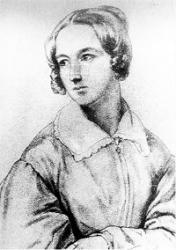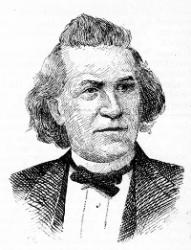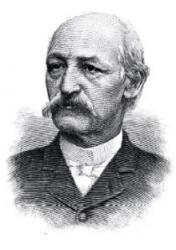Planning worship?
Check out our sister site, ZeteoSearch.org,
for 20+ additional resources related to your search.
- |
User Links
Person Results
Luise Hensel

1798 - 1876 Author of "Ever find I joy in reading" in Sacred Songs For Public Worship Text of "Müde bin ich geh zur Ruh" is printed in Lutheran Service Book, 2006 #887
=============
Hensel, Luise, daughter of J. J. L. Hensel, Lutheran pastor at Linum, near Fehrbellin, Brandenburg, was born at Linum, March 30, 1798, Though confirmed as a Lutheran in her fifteenth year, she gradually approximated to Roman Catholicism, and was formally received into that Communion, Dec. 7, 1818. During the remaining years of her life, she devoted herself mainly to the education of the young and the care of the sick. In 1874 she entered the Union of Daughters of Christian Love at Paderborn, and died at Paderborn, Dec. 18, 1876. (O. Kraus, 1879, pp. 204-211; Allgemeine Deutsche Biographie, xii. 1-3, &c.) Her best hymns were written before she was 23, and in proportion as she became an Ultramontane the poetical value of her productions declined. Her finest productions are distinguished by childlike simplicity, humility, resignation, and deep Christian love. They have won wide acceptance in Germany. The first two of those noted may be regarded as nursery classics.
A number of her hymns came into Clemens Brentano's hands as early as 1819, and were by mistake included as his in his posthumous works. A few were printed in F. Förster's Sängerfahrt, 1818, and a good many more in M. Diepenbrock's Geistlicher Blumenstrauss, Sulzbach, 1829. A complete edition of her hymns was published by Professor C. Schlüter of Münster as her Lieder at Paderborn, 1870 (4th ed., 1879).
i. Hymns in English common use:
i. Immer muss ich wieder lesen. [Holy Scripture.] This beautiful children's hymn on the Life of Christ as narrated in the Gospels, appeared in Diepenbrock, 1829, p. 265, in 7 stanzas of 4 lines (entitled "On the reading of Holy Scripture "); and in her Lieder, 1870, is dated Berlin,
1815. It is repeated in Knapp's Evangelischer Lieder-Schlatz, &, 1837, the Württemberg Gesang-Buch, 1842, &c. Translated as:—
Ever would I fain be reading. A good and full translation by Miss Winkworth in her Lyra Germanica, 2nd Ser., 1858, p. 24. It has been included in full in Psalms & Hymns, Bedford, 1859; Kennedy, 1863; Book of Praise for Children, 1881; and in America in Hatfield's Church Hymn Book, 1872, and others. In some collections it is abridged; and in the Unitarian South Place Collection, 1873, it begins, "Ever find I joy in reading."
Other translations are:—
(1) “O how sweet the wondrous story," by Mrs. Bevan, 1859, p. 142. (2) "In that book so old and holy," in Dr. H. W. Dulcken's Golden Harp, 1864, p. 25. (3) "Still I read, and weary never," by “A. M. A," in the British Herald, Feb. 1868, p. 211.
ii. Müde bin ich, geh' zur Ruh. [Evening.] This beautiful child's evening prayer, the most popular of all her hymns, appeared in Diepenbrock, 1829, p. 270, in 4 stanzas of 4 lines. In her Lieder, 1870, p. 54, dated Berlin, Autumn, 1816. Included in the Unverfälscher Liedersegen, 1851, No. 528. Translated as:—
1. Now that o'er each weary head. A free translation of stanzas i.-iii. as No. 22 in C. H. Bateman's Children's Hymns, 1872.
2. Weary now I go to rest. A good translation of stanzas i.-iii. by E. Cronenwett as No. 324 in the Ohio Lutheran Hymnal 1880.
Other translations are:—
(1) "Now I close my tired eyes," by Mrs. Bevan, 1859, p. 147. (2) "I am tir'd, and so I seek," by Miss Manington, 1863, p. 126. (3) "Weary now I go to bed," in Dr. H. W. Dulcken's Golden Harp, 1864, p. 40. (4) “Now with weariness opprest," a second translation by Dr. Dulcken, p. 72. (5) “Wearied now I seek repose," by J. Kelly, 1885, p. 111.
ii. Hymns not in English common use:
iii. Ich liebe einen Königs Sohn. [Love to Christ.] In Diepenbrock, 1829, p. 304, in 9 stanzas, and in her Lieder, 1870, p. 67, dated Berlin, 1817. Translated as "I love a royal only Son," by E. Massie, 1867, p. 174.
jv. 0 Sonne, wenn von deinem Licht. [Love to Christ.] In Diepenbrock, 1829, p. 257, in 6 stanzas, and in her Lieder, 1870, p. 128, dated Söndermühlen, 1823. Translated as "O Sun, if from thy light a ray," in J. D. Burns's Memoir and Remains, 1869, p. 270.
v. 0 Sorge, die mien niederdrückt. [Encouragement.] In Diepenbrock, 1829, p. 271, in 6 stanzas, and in her Lieder, 1870, p. 13, dated Berlin, 1815. The translations are:—(1l) "O anxious care that weighs me down," by Miss Burlingham, in the British Herald, Sept. 1865, p. 144. (2) "Begone, O load of care, begone," by J. Kelly, 1885, p. 80.
vi. Was verlangst du, warumbangst du. [Cross and Consolation.] In Diepenbrock, 1829, p. 261, in 6 stanzas entitled "Suraum corda." In her Lieder, 1870, p. 43, it is dated Berlin, 1816. Translated as "What seekest thou! Why fearest thou," by C. T. Astley, 1860, p. 28.
vii. Zu dir, zu dir, hinweg von mir. [Consecration to Christ.] In Diepenbrock, 1829, p. 267, in 5 stanzas In her Lieder, 1870, p. 31, dated Berlin, 1816. Translated as "To Thee, to Thee, away from self," by J. Kelly, 1885, p. 72. [Rev. James Mearns, M.A.]
-- John Julian, Dictionary of Hymnology
=====================
Hensel, Luise, p. 510, ii., No. v. "O Sorge," &c, appeared in Förster's Sängerfahrt, 1818, p. 266.
--John Julian, Dictionary of Hymnology, Appendix, Part II (1907)
Luise Hensel
Roswell Park
1807 - 1869 Person Name: Rev. Roswell Park Author of "Jesus spreads His banner o'er us" in Life-Time Hymns Park, Roswell, D.D., of the Protestant Episcopal Church, was born at Lebanon, Connecticut, Oct. 1, 1807, and educated at Union College and West Point. Previous to receiving Holy Orders he was in the army, and also held the appointment of Professor of Chemistry in the University of Pennsylvania. He was ordained in 1843, was President of Racine College, Wisconsin (1852-59), Chancellor of the same College (1858-63); and Principal of a school in Chicago from 1863 to his death. He died at Chicago, July 16, 1869. He published Sketch of West Point, 1840; Pantology, 1841; Handbook for European Travel, 1853; and Poems, 1836. His best known hymn is for Holy Communion. It begins "Jesus spreads His banner o'er us," and was published in his Poems, 1836. It is in common use in Great Britain and America. [Rev. F. M. Bird, M.A.]
-- John Julian, Dictionary of Hymnology (1907)
Roswell Park
Elias Nason

1811 - 1887 Person Name: E. Nason Author of "Jesus only, when the morning" in New Christian Hymn and Tune Book Nason, Elias, a Congregational minister, lecturer, and writer, was born at Wrentham, Massachusetts, April 21, 1811, and was educated at Brown University, where he graduated in 1835. He was a teacher in Georgia for some time, and from 1840 to 1849 in Newburyport, Massachusetts. Subsequently he entered the Congregational ministry. He is the author of several biographies. In 1855 he published Songs for the School Room; in 1857 his Congregational Hymn Book; and in 1863, in conjunction with Dr. Edward Kirk, Songs for Social and Public Worship. His hymn, "Jesus only, when the morning " (Jesus always), was written at Natick, Massachusetts, about 1856, and was published with music by the author in the Boston Wellspring. [Rev. F. M. Bird, M.A.]
--John Julian, Dictionary of Hymnology (1907)
====================
http://en.wikipedia.org/wiki/Elias_Nason
Elias Nason
John Rowe
1764 - 1832 Author of "From the Table Now Retiring" in The Cyber Hymnal Rowe, John, 1764-1833. Minister at Shrewsbury and at Lewin's Mead, Bristol. His hymn on the Anticipation of Old Age, which appeared in the Bristol Collection, 1806, is also in Martineau’s Hymns for the Christian Church and Home, "When in the vale of lengthened years." Another and somewhat popular hymn by Rowe from the same Collection is “From the Table now retiring." After Holy Communion. For fuller details see Duffield's English Hymns, &c, 1886, p. 162.
--John Julian, Dictionary of Hymnology (1907)
John Rowe
Esteban Sywulka B.
b. 1942 Person Name: Esteban Sywulka Author (estr. 4) of "Hoy venimos cual hermanos" in Mil Voces para Celebrar
Esteban Sywulka B.
M. N. Hutchinson
1835 - 1935 Person Name: Merrill Hutchinson Translator of "Hoy venimos, cual hermanos" in Himnos de la Iglesia Merill N. Hutchinson.
As of 1871, Hutchinson was pastor of a Presbyterian church in Dunellen, New Jersey. In 1873, he resigned his pastorate and moved to Mexico City. His works include:
Himnario de las Iglesias Evangelica
Translations--
Amoroso Salvador
Con Cánticos, Señor
Hay una Fuente sin Igual
Obediente a Tu Mandato
© The Cyber Hymnal™ (www.hymntime.com/tch)
M. N. Hutchinson
Mateo Cosidó
Person Name: M. Cosido Author of "En espíritu unidos" in Himnario Adventista
Mateo Cosidó
Henry Bateman
1802 - 1872 Person Name: Bateman Author of "Gracious Saviour, thus before thee" in New Manual of Praise Bateman, Henry, a popular writer of hymns for children, was descended from the De Voeux, a Huguenot family. Born on March 6, 1802, in Bunhill Row, Finsbury, he was educated for commercial pursuits, and followed the trade of a timber merchant. He died in 1872. During the greater part of his life he was addicted to the writing of poetry, but his hymns were mostly written between 1856 and 1864. His published works are:—
(1) Belgium and Up and Down the Rhine, 1858; (2) Sunday Sunshine: New Hymns and Poems for the Young, 1858; (3) Home Musings: Metrical Lay Sermons, 1862; (4) Heart Melodies: Being 365 New Hymns and Psalms, 1862; (5) Fret Not, and Other Poems, including Hymns with music, 1869.
From his Sunday Sunshine (Lond., Nisbet & Co., 1858) the following hymns have come into common use:—
1. A holy and a happy youth. Youthful Piety.
2. A noble river, wide and deep. Finding of Moses.
3. A sparrow with its plain brown coat. Providence.
4. A thought is but a little thing. Little Things.
5. A tranquil heart and pleasant thought. Peace.
6. A pebble in the water. Little Things.
7. Always by day, always by night. Omniscience.
8. And is it true that Jesus came? Good Shepherd.
9. At Jordan John baptizing taught. Whitsuntide.
10. Cross purposes, how sad they are. Duty.
11. Daniel was right as right could be. Duty.
12. From grassy nest on fluttering wing. Providence.
13. God does not judge as we must do. Charity.
14. God made the sea, the wide, deep sea. Providence.
15. Good night, good night, the day is done. Evening.
16. Great God, the world is full of Thee. Omnipresence.
17. How joyously amongst the flowers. Cain & Abel.
18. I always love those friends the best. Jesus the Truth.
19. If anything seems too hard to do. Perseverance.
20. In Eden's garden, fair and bright. Holiness.
21. In my soft, bed when quite alone. Omniscience.
22. In the wild desert, far from home. Providence.
23. It is but little that I know. Faith.
24. May I touch His garment's hem. Faith.
25. No tears in heaven! ah, then 1 know. Heaven.
26. O lead me not, O lead me not. The Lord's Prayer.
27. On the green grass five thousand men. Providence.
28. Over the fields in hedgerows green. Duty.
29. Sometimes I do not like to feel. Solitude.
30. There is one thing quite sure to make. Good Temper.
31. Thou blessed Jesus, pity me. Jesus the Guide.
32. Through all the way, the little way. Providence.
33. 'Tis very wonderful, I'm sure. Trust.
34. Tramp, tramp upon their unknown way. The Red Sea.
35. When God bade Abraham sacrifice. Resignation.
36. When Jairus's daughter was so ill. Power of Christ.
37. When morning, fresh and bright and new. Morning.
38. The good old book! with histories. Holy Scriptures.
39. Year after year, with patient love. A Parent's Love.
In addition to the foregoing the following from his Heart Melodies, &c. (Lond., Snow, 1862), are also in common use, and have attained to some popularity:—
40. Gracious Saviour, gentle Shepherd [thus before Thee]. Evening.
41. Let us pray, the Lord is willing. Prayer.
42. Was it for me, dear Lord, for me? Good Friday.
As will be gathered from the above list of hymns in common use, the Sunday Sunshine has been the most successful of Mr. Bateman's works. This success is due mainly to the fact that the hymns deal with subjects easily treated of in hymns for children. His hymns are hearty and natural in tone. Some of the best of those published in the Sunday Sunshine were given in the Book of Praise for Children, 1875, edited by W. Garrett Holder, and from thence have passed into many collections for children. His best hymn is "Light of the world! Whose kind and gentle care" (q. v.). It is a prayer of more than usual merit for Divine guidance. [Rev. W. Garrett Holder]
-- John Julian, Dictionary of Hymnology (1907)
Henry Bateman
E. E. Higbee

1830 - 1889 Author of "Jesus, o'er the grave victorious" in The Chapel Hymnal Born: March 27, 1830, St. George (near Burlington), Vermont.
Died: December 13, 1889.
Buried: Emmitsburg, Maryland.
Son of state legislator Lewis Higbee and Sarah Baker Higbee, Elnathan was educated at the University of Vermont, graduating in 1849. By the time of his graduation, he had already begun teaching school in Burlington at age 16; his first permanent position was as an assistant teacher at an academy in Woodstock, Vermont. He stayed there only a short time before moving to another teaching position in Emmitsburg, Maryland, becoming head of the mathematical and classical departments at a school organized by his brother-in-law, George W. Aughinbaugh. In 1850, he accepted a position s a private tutor in the family of Joshua Motter of Emmitsburg, among whose daughters he found his future wife.
Around late 1851 or early 1852, Higbee entered the Theological Seminary of the Reformed Church at Mercersburg, Pennsylvania, where Philip Schaff was among his teachers.
He went on to become a preacher, poet, and educator, and for nine years, served as Superintendent of Public Instruction of Pennsylvania. After seminary, he taught mathematics at the high school in Lancaster, Pennsylvania, for a year. Later in his life, when he was state superintendent for education, he would discover one of his old pupils had become principal of the Lancaster high school.
In 1845, Higbee was licensed to preach the Gospel by the Maryland Classis of the Reformed Church. His first pastorate was at the Congregational Church in Bethel, Vermont. In 1858, he returned to Emmitsburg, and 1859 to the First Reformed Church of Tiffin, Ohio, where he also filled the chair of Latin and Greek at Heidelberg College. In 1862, he moved to Pittsburgh to become pastor of Grace Church. In 1864, he became professor of Church History and New Testament Exegesis at the Theological Seminary of the Reformed Church in Mercersburg, Pennsylvania. While there, he was of the prime movers in the foundation of Mercersburg College in 1865. In 1881, Governor Hoyt appointed him State Superintendent of Public Instruction of Pennsylvania.
Sources: Pennsylvania School Journal
www.hymntime.com/tch/
E. E. Higbee
Minot J. Savage
1841 - 1918 Person Name: M. J. S. Author of "We remember thee, O brave ones" in Sacred Songs For Public Worship Savage, Minot Judson, D.D., was born at Norridgewock, Maine, June 10, 1841, and educated at Bangor Seminary, where he graduated in 1864. From 1867 to 1873 he was a Congregational Minister, and then he joined the Unitarians, and has now (1900) a charge in Boston. He has published several works, including Poems, Boston, 1882. He also edited, with H. M. Dow, Sacred Songs for Public Worship, Boston, 1883, to which he contributed 46 original hymns. In hymnals other than this, of his hymns the following are in common use:—
1. Dost thou hear the bugle sounding. Consecration to Duty.
2. Father, we would not dare to change Thy purpose, &C. Prayer.
3. 0 God Whose law is in the sky. Consecration to Duty.
4. 0 star of truth down shining. Truth.
5. The God that to the fathers revealed His holy will. God unchangeable.
6. The very blossoms of our life. Holy Baptism.
7. What purpose burns within our hearts. Joining in Church Fellowship.
8. God of the glorious summer hours. New Year This is in D. Agate's Sunday S. Hymn Book, 1881, No. 371, and dated 1875. From the Sunny Side, N.Y.. 1875,p. 119.
Some of these hymns are given in Hunter's Hymns of Faith and Life, Glasgow, 1889, and recent American hymnals.
--John Julian, Dictionary of Hymnology, New Supplement (1907)
Minot J. Savage


 My Starred Hymns
My Starred Hymns


